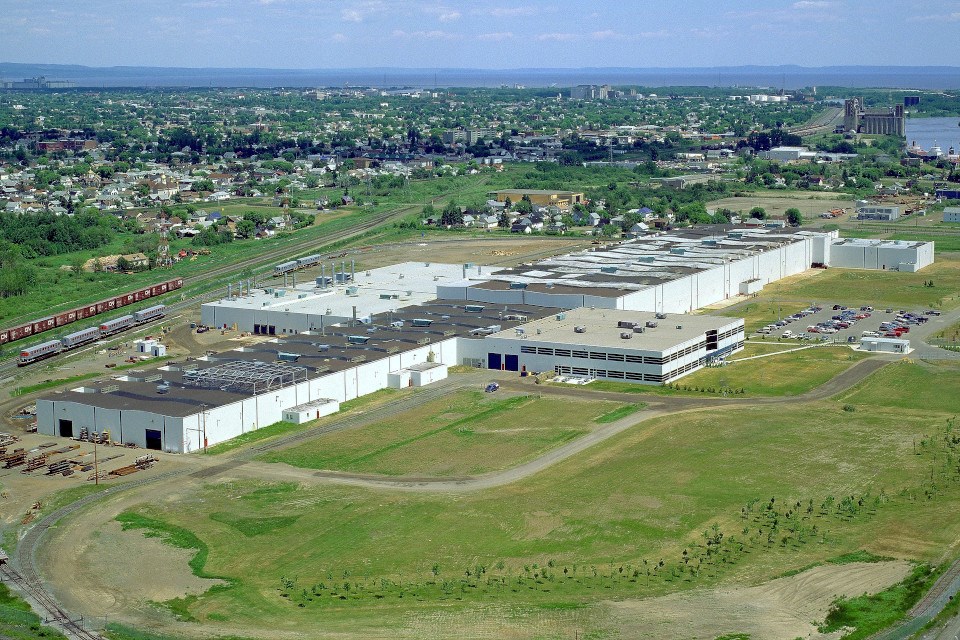Thunder Bay's Alstom rail coach assembly plant has received a new lease on life.
Ottawa, Queen's Park and the City of Toronto are teaming up to spend $568 million on the purchase of 60 new electric streetcars for the Toronto Transit Commission (TTC) that will be assembled at the Alstom facility in the city's south end.
The start of delivery of these vehicles to the TTC begins in 2023.
The procurement order maintains jobs at the city's largest private sector employer and keeps the doors open at one of Thunder Bay's cornerstone industries.
The lack of rail passenger coach orders in recent years has dwindled the workforce at the struggling facility from 1,100 to just 300.
"We have been unwavering as a federal government in our support in the fight to keep the Alstom facility open and protect good union jobs," said federal Infrastructure and Communities Minister Catherine McKenna in a web funding announcement on May 12.
The funding breakdown is $180 million each from the federal and provincial governments with the City of Toronto investing $208 million.
Want to read more stories about business in the North? Subscribe to our newsletter.
Last fall, the City of Toronto and the TTC had already made an initial order of 13 Flexity Outlook streetcars from Thunder Bay with its own money with the confidence that the feds and province would come through to purchase the remaining 47 vehicles in this order.
Part of this funding is also earmarked toward expanding the TTC's Hillcrest streetcar storage facility in Toronto.
The former Bombardier plant in Thunder Bay was acquired by Alstom, a France-based train manufacturer, last September. Negotiations between the various levels of government, the company, and Unifor seemed to pick steam after that transaction.
The federal funding is part of Ottawa's $14.9-billion plan to deliver new public transit funding over eight years.
Thunder Bay-Superior North MP Patty Hajdu called the plant an economic mainstay for the region that contributes to Canada's larger economy.
She related the story of her son, now a crane operator apprentice, who once worked the floor at the then-Bombardier plant as a welder. Instability at the plant forced his layoff but a few years later while in Toronto, Hajdu said her son took great pride in seeing one of these new streetcars in operation.
"He was so excited and so proud to be someone who worked on one of those new streetcars."
The plant is not only about providing good union jobs, Hajdu said, but allows people like her son to develop as tradespeople.
"Northern Ontario has often struggled but we matter, and today this announcement really shows that we matter."
Provincial Energy, Northern Development and Mines Minister Greg Rickford said this announcement makes good on his government's two-year-old pledge to do everything it could to preserve good paying jobs in the city.
The streetcar order comes on top of another order to refurbish up to 200 bi-level GO train coaches at the Thunder Bay facility, securing up to 330 jobs over the next two years.
"I have a feeling there's more to come," Rickford said, "because we know this facility has the capacity to do even more."
Besides being part of Thunder Bay's industrial fabric, Rickford said the plant has demonstrated its "incredible potential" to pivot during the fight against the pandemic by delving into ventilator production.
A relieved Thunder Bay Mayor Bill Mauro said preservation of the plant has been on his mind for more than two years.
After dozens of phone calls with senior government officials, Mauro said a conversation with McKenna a few months ago left him with a degree of confidence that good news was coming. Provincial Transportation Minister Caroline Mulroney phoned him last night to confirm province's funding commitment.
Mauro believes the strength and capacity of this plant can provide public transit solution for the growing needs of the Greater Toronto and Hamilton areas for years to come.
Toronto Mayor John Tory called this streetcar funding order from Thunder Bay a "team effort" that brings their transit strategy to buy new vehicles finally come to fruition.
This deal, he said, not only benefits two communities but workers and manufacturing supply chains in Ontario and Quebec.
This is not act of charity for workers for Thunder Bay, Tory said, but it's about buying a "quality, Canadian-made, emission-free product."
"This is good news for a lot of people in Toronto but its also good news for a lot of people who make these streetcars in Thunder Bay."
These streetcars are needed to meet increasing demand from passengers, he said.
In pre-pandemic times, Toronto iconic streetcar fleet moves 230,000 passengers daily. With these vehicles able to carry 150 riders, the equal of three buses, Tory said this procurement order of zero-emission vehicles will provide manufacturing jobs and add to a greener Toronto.
Unifor national president Jerry Dias said this shows what can be accomplished when government, corporations and unions work together to find solutions, hearkening back to a similar deal that's kept Ford's Oakville automotive plant open and reconfigured to start manufacturing electric vehicles.
Dias called it an "incredible day" that Thunder Bay will take part in "greening" Toronto's transit system.
The message sent to young workers, he said, is they don't have to leave Thunder Bay to find work.
"Today's announcement is a start but today's announcement is really about securing jobs for the present but importantly for the future."
In thanking all levels of government, Souheil Abihanna, president of Alstom Canada, remarked this investment allows the company to retain jobs and expertise and sa killed workforce in Thunder Bay.
He further thanked the TTC and Metrolinx for their "renewed trust and confidence" in the company, and extended thanks to the community and Unifor for "maintaining the viability of our Thunder Bay facility."




